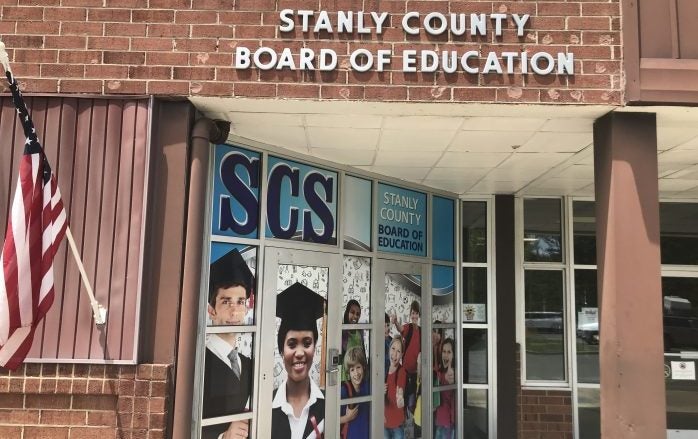School board further discusses parental consent for student name, pronoun changes
Published 4:49 pm Wednesday, March 20, 2024

- Stanly County Schools is headquartered in Albemarle.
|
Getting your Trinity Audio player ready...
|
The Stanly County Board of Education discussed at length changes to the process regarding a student’s gender identity and chosen pronouns at a work session Monday.
Superintendent Dr. Jarrod Dennis relayed advice given to him by an attorney regarding a proposed policy change from the most recent board meeting. The policy change would have updated current procedures to align with the Parents’ Bill of Rights Act recently passed by the state legislature.
“(The lawyers) are saying if the General Assembly could have written into policy more strict guidelines or moves forward for certain things, they would have,” Dennis said.
One change to the policy would be to extend definitions of what is taught in sex education classes. Currently, the policy was only for students in kindergarten through the third grade, but the board discussed extending those restrictions through 12th grade.
Dennis said legal advice on making the change in grade levels “was not that big of a deal.”
“His (advice) was more on the other part,” referring to parental notification versus parental consent on a student changing his or her name, gender identity or chosen pronouns.
“They said you can inform a parent and have a conversation with them, and we all decide the best way to move forward,” Dennis said about the advice given. “You could get challenged on that whole consent part.”
Board member Dustin Lisk asked Chris Campbell, of the Asheville law firm Campbell and Shatley, speaking to the board via conference call, what happens if he as a parent is informed of his child wanting to change his name.
“I would say, ‘Well, I’m the legal guardian of that child. You are not to call them by that name. You are to call them by the name I gave them.’ I feel like we need to add something in there so the people understand that’s what we’re going to do. We’re going to essentially take their consent, because otherwise if we don’t, we’re going against their consent,” Lisk said.
Campbell said even before the Parents’ Bill of Rights, for approximately the last 10 years, he and his law firm have recommended the board take each student who asks to change their name or pronouns on a case-by-case basis.
He said a meeting should take place between the student, parents, principal and a school counselor or someone from the central office. The meeting should try to discern not just school issue but other issues like whether the student wants to transition and how parents feel about it.
Campbell also said existing students expressing a gender identity issue, “if it is consistent and persistent, they have rights under federal law from Title IX. The parents also have rights under the 14th Amendment and under state law, the Parents’ Bill of Rights. Those have to be balanced.”
Lisk asked how Title IX can be infringed if a school system does not allow a minor child, who can not change their name legally, to be called “whatever name they want.”
Campbell said a preferred name for a student is different than a legal name change, adding the Fourth Circuit federal court has included gender identity under the term “sex” in Title IX, and a board of education “can not discriminate under the basis of sex.”
He said students whose parent did not support a change might, although “very unlikely,” may under Title IX protection get a guardian ad litem, “someone appointed outside their family to either take their rights to separate themselves from their family, or assert their rights under Title IX.”
Lisk said he “had a hard time seeing that we have legal risk when the parent is responsible for the child.” He also asked if the protections were relevant for students at charter or private schools or “a charter school that is publicly funded.”
Board member Bill Sorensen said if a school system “is government-funded, then we have to abide by Title IX. I don’t want to say, ‘I told you so,’ but when we incorporated Title IX into our policies, this is why I voted no. I saw this BS coming. Until someone challenges it, it’s going to be that way.”
Campbell said “the law absolutely would not go as far as saying that a parent has to consent to the name change. It just says they have to be notified of it. Now, what happens after that notification is going to vary on a case-by-case basis.”
Referring to parents not being able to consent, Lisk said, “doesn’t that prompt a parent to pull their kid outside of the state school system? I don’t understand why there is collaboration when we’re talking about a minor child.”
Lisk also said the legislature passed the Parents’ Bill of Rights “forcing the school boards to vote on [the legislature’s] inability to stick their neck out. Somehow, little Stanly County’s got to stick their neck out on this policy. I completely disagree with this.”
The board also discussed with Campbell the idea of a policy to allow parents to allow or deny their children to take a well-being questionnaire for students younger than 18 years old or emancipated students.
The questionnaire, according to board chair Carla Poplin, is a health screening form which falls under the heading of protected topic surveys. She added the questionnaire is “related to children’s mental, emotional and physical health.”
Lisk said “I would like to see them same notification and consent that’s provided to parents as their bill of rights in kindergarten through third (grade), and to say … we’re going to extend that through 12th grade, or if they’re age 18 or emancipated.”
The board took no action in the work session regarding the two policies, so the polices will go the policy committee. Any changes will then be presented to the full school board, which will table the policies for 30 days to allow anyone time to review.



